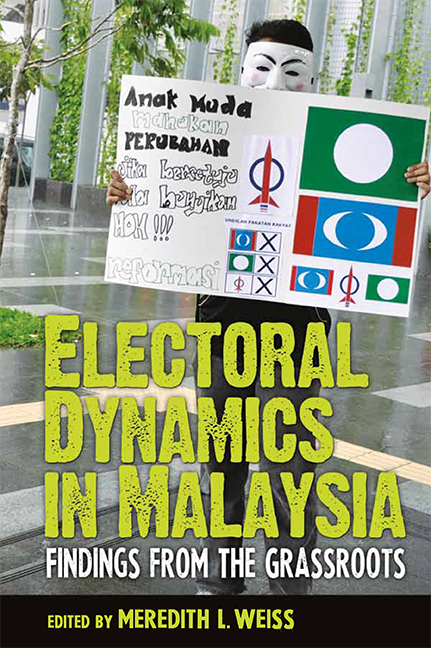Book contents
- Frontmatter
- Contents
- List of Tables
- Foreword
- Acknowledgements
- Glossary & Acronyms
- Chapter 1 Introduction: Patterns and Puzzles in Malaysian Electoral Dynamics
- Chapter 2 Arau, Perlis: The Irresistible Charm of Warlords, Women and Rewards?
- Chapter 3 Padang Serai, Kedah: Between the ‘Personal Touch’ and the Generous Hand
- Chapter 4 Kuala Nerus, Terengganu: New Malay Politics?
- Chapter 5 Balik Pulau, Penang: Home Run for the Home Boys
- Chapter 6 Lumut, Perak: Patronage, Clientelism and the Post-Coup Order
- Chapter 7 Kuantan, Pahang: Revealing the Ordinary
- Chapter 8 Pandan, Selangor: New Electoral Dynamics in Urban Malaysia
- Chapter 9 Kepong and Titiwangsa, Kuala Lumpur: Messages or Money?
- Chapter 10 Rembau, Negeri Sembilan: Personalities and Promises
- Chapter 11 Pulai, Johor: A Tale of Two Coalitions
- Chapter 12 Gelang Patah, Johor: Did Lim Kit Siang Truly Win His Last Gamble?
- Chapter 13 Kota Marudu and Keningau, Sabah: Personality, Patronage and Parochial Politics
- Chapter 14 Tuaran, Sabah: Party Loyalty and Rational Voting
- Chapter 15 Kota Kinabalu, Sabah: BN Loses Its ‘Fixed Deposit’
- Chapter 16 Beaufort, Sabah: Whither Lajim's Popularity?
- Chapter 17 Sibu and Lanang, Sarawak: Defeat of the Bosses
- Contributors
Chapter 17 - Sibu and Lanang, Sarawak: Defeat of the Bosses
Published online by Cambridge University Press: 10 November 2017
- Frontmatter
- Contents
- List of Tables
- Foreword
- Acknowledgements
- Glossary & Acronyms
- Chapter 1 Introduction: Patterns and Puzzles in Malaysian Electoral Dynamics
- Chapter 2 Arau, Perlis: The Irresistible Charm of Warlords, Women and Rewards?
- Chapter 3 Padang Serai, Kedah: Between the ‘Personal Touch’ and the Generous Hand
- Chapter 4 Kuala Nerus, Terengganu: New Malay Politics?
- Chapter 5 Balik Pulau, Penang: Home Run for the Home Boys
- Chapter 6 Lumut, Perak: Patronage, Clientelism and the Post-Coup Order
- Chapter 7 Kuantan, Pahang: Revealing the Ordinary
- Chapter 8 Pandan, Selangor: New Electoral Dynamics in Urban Malaysia
- Chapter 9 Kepong and Titiwangsa, Kuala Lumpur: Messages or Money?
- Chapter 10 Rembau, Negeri Sembilan: Personalities and Promises
- Chapter 11 Pulai, Johor: A Tale of Two Coalitions
- Chapter 12 Gelang Patah, Johor: Did Lim Kit Siang Truly Win His Last Gamble?
- Chapter 13 Kota Marudu and Keningau, Sabah: Personality, Patronage and Parochial Politics
- Chapter 14 Tuaran, Sabah: Party Loyalty and Rational Voting
- Chapter 15 Kota Kinabalu, Sabah: BN Loses Its ‘Fixed Deposit’
- Chapter 16 Beaufort, Sabah: Whither Lajim's Popularity?
- Chapter 17 Sibu and Lanang, Sarawak: Defeat of the Bosses
- Contributors
Summary
Introduction
Electorally speaking, Sarawak stands out in Malaysia due to its particular political history, ethnic demography and geography. Also, Sarawak, unlike the other Malaysian states, does not hold state and parliamentary elections concurrently. As Sarawak held its state elections in 2011, only parliamentary elections were held in 2013. Another striking feature of the state is that despite its fairly small population of about 2.4 million, it is given a generous allotment of thirty-one seats in the federal parliament. In contrast, Selangor, which has about 5.4 million people, only has twentytwo parliamentary seats. A similar imbalance also occurs within Sarawak. The Sibu constituency, an urban seat spanning three state seats, has 64,601 registered voters and covers an area much larger than the state of Penang, while Lawas, a rural constituency, has only 18,845 registered voters.
Sibu District, located in the lower Rejang River, comprises two parliamentary seats, the Lanang and Sibu constituencies. Both are ethnic Chinese-majority seats, with Iban and Malay-Melanau making up the remainder of the population. The Democratic Action Party (DAP) candidate, Alice Lau Kiong Yieng, won with a comfortable majority in Lanang, defeating four-term member of parliament (MP) Tiong Thai King. In the Sibu constituency, the DAP's Oscar Ling Chai Yew defeated the Sarawak United Peoples’ Party's (SUPP) candidate, Vincent Lau Lee Ming (no relation to Alice). Compared with the 2008 general election, voting rates in both areas increased substantially. Indeed, voter turnout in the 2013 general election (GE13) across urban areas of Sabah and Sarawak, such as Kota Kinabalu, Kuching and Sibu, averaged up to 80 per cent. The return to Sibu of a large number of voters who work or reside elsewhere for the purpose of voting was a major cause of the high voting rates.
The electoral results in Sibu and Lanang constituencies suggest that ethno-patronage politics is continuing to lose its hold on urban voters, a majority of whom are Chinese. In the following sections, I will provide a closer study of the backgrounds of the candidates representing both sides, as well as their electoral campaigns, to shed light on the core issues that concerned Sibu voters.
- Type
- Chapter
- Information
- Electoral Dynamics in MalaysiaFindings from the Grassroots, pp. 235 - 250Publisher: ISEAS–Yusof Ishak InstitutePrint publication year: 2013



